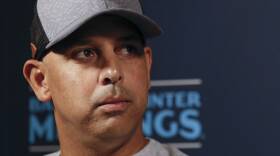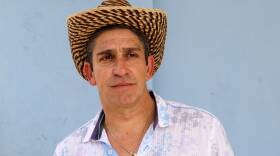EXPLORE MORE
Coming up Thursday on BPR:
NBC’s Chuck Todd
NAACP’s Michael Curry
Environmentalist Bill McKibben
Boston Globe film critic Odie Henderson
Recent segments
-
Michael Kirk On Frontline's Latest Doc: America's Great Divide
The latest Frontline documentary examines the divisive decade in politics. -
Corby Kummer On How Dry January Started A Movement That's Helping Bartenders Get Sober
Movements like dry January are helping even bartenders find sobriety. -
Trenni Kusnierek On Cora Cheating Scandal: ’This Is A Career Ruiner'
The NBC Sports commentator broke down exactly what’s at stake for the Red Sox manager. -
Why 'Jeopardy! The Greatest Of All Time' Is So Popular
TV expert Bob Thompson says the popularity is due to a mix of nostalgia for the game itself and for host Alex Trebec. -
Village Voice: Richard Blanco On The Enduring Sonnet
The inaugural poet recited a handful of modern takes on the classic form. -
Sennott: Trump's Iran Policy Is Made Without Any Sense of History
WGBH News Analyst Charlie Sennott said that Trump's actions could lead to further instability in the region.
Listen to previous shows
-

Corby Kummer: Turkeys may be harder to find this holiday season
Holiday meals may look a little different this year due to numerous food shortages and high prices. Food writer Corby Kummer joined Boston Public Radio on Monday to share what you can expect at grocery stores. While turkey shortages have happened in years prior, this season will be particularly rough: more than 6 million turkeys have died already this year due to avian flu outbreaks nationwide, and that number is expected to rise. “Once there’s one turkey with avian flu, enormous warehouses full of turkeys have to be destroyed,” Kummer said. Instead of panic-buying holiday staples like turkey, Kummer suggests switching to alternative holiday dishes, such as capon. Kummer is the executive director of the Food and Society policy program at the Aspen Institute, a senior editor at The Atlantic and a senior lecturer at the Tufts Friedman School of Nutrition Science and Policy. -

BPR Full Show: Political Climate
Today on Boston Public Radio: Jesse Mermell and Jennifer Nassour joined us for a political roundtable ahead of tomorrow’s midterm elections, giving us a look into Democrats’ and Republicans’ political strategies both state- and nationwide. Mermell is founder and president of deWit Impact Group, and a former candidate for Congress in Massachusetts’ 4th Congressional district. Nassour is the founder of the Pocketbook Project, and a former chair of the Massachusetts Republican Party. Then, we opened the phone lines, talking with listeners about their expectations for election day. Jim Aloisi and Stacy Thompson shared their thoughts on MBTA General Manager Steve Poftak’s January departure, and other transit headlines. Aloisi is a former transportation secretary, a member of the Transit Matters Board, and contributor to Commonwealth Magazine. Thompson is executive director of Livable Streets Alliance. David Cash discussed the move from diesel-powered school buses to electric, and a new report finding that Boston’s 2030 climate goals are out of reach. Cash is the New England administrator for the Environmental Protection Agency. Revs. Irene Monroe and Emmett G. Price III talked about the Black Bostonians moving south, and the rise of Christian leaders in some GOP midterm races. Rev. Monroe is a syndicated religion columnist and the Boston voice for Detour’s African American Heritage Trail. Rev. Emmett G. Price III is founding pastor of Community of Love Christian Fellowship in Allston, the Inaugural Dean of Africana Studies at Berklee College of Music. Corby Kummer weighed in on holiday dinners in times of inflation, and whether A.I. has the potential to write recipes better than humans. Kummer is the executive director of the Food and Society policy program at the Aspen Institute, a senior editor at The Atlantic and a senior lecturer at the Tufts Friedman School of Nutrition Science and Policy. We ended the show by talking with listeners about their climate concerns amid a heatwave in Boston. -

BPR Full Show: Daylight Saving Time
Today on Boston Public Radio: We began the show by asking listeners about the voting patterns of white women ahead of the midterms. Shirley Leung talked about Mass. Governor Charlie Baker's multi billion dollar spending bill, her own latest piece on Mass. ballot Question 1, and women’s entrepreneurship in Boston. Leung is a business columnist for the Boston Globe Callie Crossley discussed white suburban women’s’ swing to the right ahead of midterms and Kyrie Irving’s recent anti-Semitic tweet. Crossley is the host of GBH's “Under the Radar.” Andrea Cabral explained the Lady of the Dunes story, and new city laws about throwing out mattresses and handling food waste. Cabral is the former Suffolk County sheriff, former Massachusetts secretary of public safety and former CEO of the cannabis company Ascend. Jared Bowen gave his thoughts on climate protesters using art as a means of getting attention, shared his thoughts on the new film “Armageddon Time,” and discussed the MFA’s “Frank Bowling’s America” and “To Begin Again” at the ICA. Bowen is GBH’s executive arts editor and the host of Open Studio. Pamela Means joined us for another installment of live music Friday. She chatted about the history and legacy of protest music, and sang us a few songs. Means is a singer/songwriter based out of Easthampton. We ended the show by talking about daylight saving time. -

Behold, the Butter Board: Corby Kummer revisits the TikTok trend
Some food writers and critics skeptical over butter boards — a TikTok food trend consisting of softened butter over a charcuterie board and topped with various herbs, spices, fruits, and more — are now wholeheartedly embracing the buttery dish. Even legendary chef Jacques Pépin jumped on the trend, posting a video to Facebook with his own take on the butter board. “A couple of things: they’re easy to make. As Jacques said in his sexy accent, you put it on a plate — you don’t have to put it on a board,” Kummer said. “What’s great about them is that you can invent whatever you want, as much as you think you’re going to go through, and it lasts — you don’t have to throw it out. You have to refrigerate it and then bring it back to room temperature, but it’s very practical.” Kummer is executive director of the Food and Society policy program at the Aspen Institute, a senior editor at The Atlantic and a senior lecturer at the Tufts Friedman School of Nutrition Science and Policy. -

BPR Full Show: Means of Production
Today on Boston Public Radio: Chuck Todd updated us on the latest political headlines, focusing on upcoming midterm elections and America’s worsening political divide. Todd moderates “Meet the Press,” and co-hosts “Meet the Press Now” on NBC Now. We then opened up phone lines, asking listeners about what’s on their minds ahead of the midterm elections. Art Caplan weighed in on whether it’s time to declare pandemic amnesty. Caplan is the Drs. William F. and Virginia Connolly Mitty Professor and founding head of the Division of Medical Ethics at NYU School of Medicine in New York City. Dr. Kimberly Parker discussed the potential impact of the Supreme Court hearing on cases regarding affirmative action. Parker is a former teacher and authority on all things education. Currently, she directs the Crimson Summer Academy at Harvard. She was formerly president of the Black Educators’ Alliance of Massachusetts. Her latest book is "Literacy is Liberation: Working Towards Justice Through Culturally Relevant Teaching.” Corby Kummer remembered the lives of food writers Julie Powell, the blogger behind “The Julie/Julia Project,” which served as the inspiration for Nora Ephron’s “Julie & Julia” movie, and Gael Greene, restaurant critic and founder of Citymeals on Wheels. Kummer is executive director of the Food and Society policy program at the Aspen Institute, a senior editor at The Atlantic and a senior lecturer at the Tufts Friedman School of Nutrition Science and Policy. Jon Gruber explained how the Federal Reserve could fight inflation by raising interest rates – and the implications of doing so. Gruber is the Ford Professor of Economics at MIT. His latest book is “Jump-Starting America: How Breakthrough Science Can Revive Economic Growth and the American Dream.” We ended the show by talking about a decrease in worker productivity, according to data from the Bureau of Labor Statistics.









